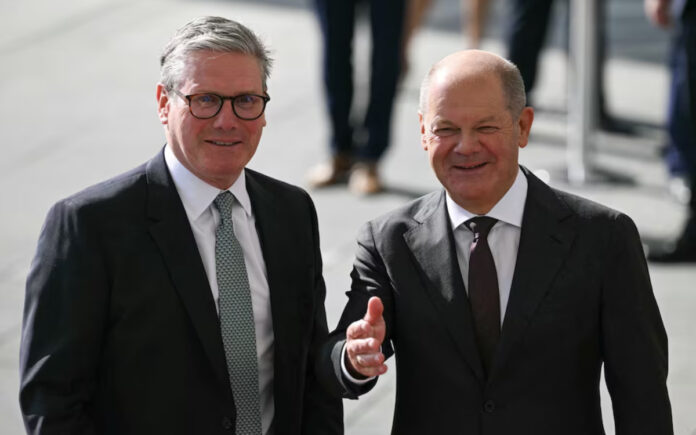Berlin: In a pivotal meeting held in Berlin on Wednesday, British Prime Minister Keir Starmer and German Chancellor Olaf Scholz agreed to collaborate on an “ambitious” treaty aimed at resetting British-EU relations. The proposed treaty is set to cover a broad range of areas, including defense and trade, marking a significant step toward rebuilding ties between the United Kingdom and the European Union.
Starmer’s visit to Germany and France is part of a broader effort to move beyond the strained relations that characterized the previous Conservative government’s approach to Europe. Since taking office last month, Starmer has prioritized strengthening these ties as a cornerstone of his strategy to boost the UK’s economic growth.
Speaking on the proposed treaty, Starmer described it as a “once-in-a-generation chance” to benefit both Britain and Germany by deepening collaboration in critical sectors such as science, technology, business, and culture, while simultaneously enhancing trade between the two nations.
“Let me be clear, growth is the number one mission of my government,” Starmer asserted. “And what we understand clearly is that building relationships with our partners here in Germany and across Europe is vital to achieving it.”
Addressing a joint press conference with Scholz, Starmer clarified that this reset does not imply a reversal of Brexit or a return to the EU’s single market or customs union. Instead, it represents a desire for closer cooperation across various domains, including the economy and defense.
Scholz echoed this sentiment, welcoming the UK’s initiative. “The United Kingdom has always been an indispensable part of solving the big issues that affect the whole of Europe,” Scholz stated. “This has not changed since it left the EU.”
In a joint declaration, the two leaders expressed their intention to sign the cooperation treaty during government consultations “by early next year.” They also revealed that their defense ministers are working on a new defense agreement, following the joint defense declaration signed in July.
As NATO allies and leading defense spenders in Western Europe, the UK and Germany are keen to enhance their defense collaboration. This comes amid concerns about a potential reduction in U.S. military support for Ukraine if former U.S. President Donald Trump were to return to the White House.
Also Read | Antarctic Transformation: Scientists Debate Potential Point of No Return
The Trump Factor
Trump, the Republican presidential candidate, has signaled a willingness to reassess “NATO’s purpose and NATO’s mission” if re-elected. He has also suggested that the U.S. may not continue its current level of support for Ukraine and has criticized NATO allies who fail to meet their defense spending commitments. With Trump in a close race against Vice President Kamala Harris for the November 5th election, the prospect of reduced U.S. support for Ukraine has become a growing concern.
Trump’s selection of JD Vance as his running mate has further fueled these concerns. Vance has been vocal about his opposition to the U.S. providing “blank checks” to Ukraine in its ongoing conflict with Russia.
An enhanced Anglo-German defense partnership could potentially mirror the Lancaster House agreements between Britain and France, established in 2010. These agreements included commitments to create a joint military force and share equipment and nuclear research facilities.
Also Read | Senegal Halts Mining to Protect Faleme River and Local Communities
In addition to defense, Starmer and Scholz agreed to intensify cooperation on pressing social issues, including illegal migration. They announced plans to develop a joint action plan to combat people smuggling, an issue that has garnered significant attention in Germany following a recent knife attack attributed to a suspected Islamic State member from Syria.
Following his engagements in Berlin, Starmer is set to travel to Paris for the Paralympics opening ceremony on Wednesday night. On Thursday, he will hold a breakfast meeting with executives from major companies, including Thales, Eutelsat, Mistral AI, and Sanofi, before concluding his visit with talks with French President Emmanuel Macron at the Elysée Palace.



